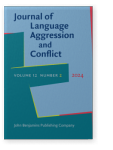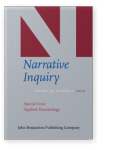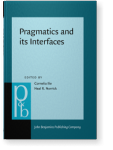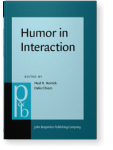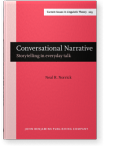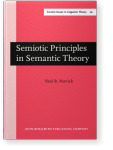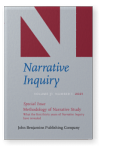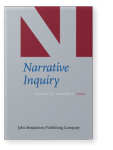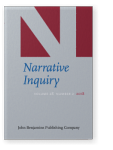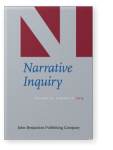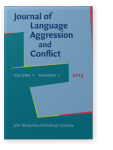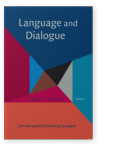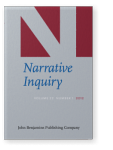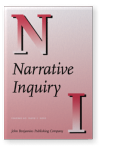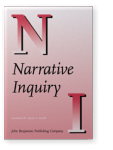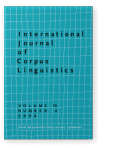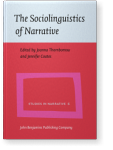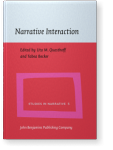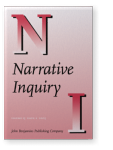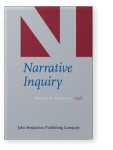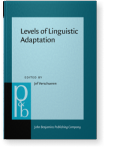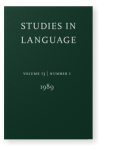Neal R. Norrick
List of John Benjamins publications for which Neal R. Norrick plays a role.
Journals
ISSN 1387-6740 | E-ISSN 1569-9935
Pragmatics and its Interfaces
Edited by Cornelia Ilie and Neal R. Norrick
[Pragmatics & Beyond New Series, 294] 2018. vi, 313 pp.
Subjects Communication Studies | Discourse studies | Pragmatics
Humor in Interaction
Edited by Neal R. Norrick and Delia Chiaro
[Pragmatics & Beyond New Series, 182] 2009. xvii, 238 pp.
Subjects Discourse studies | Pragmatics | Sociolinguistics and Dialectology
Conversational Narrative: Storytelling in everyday talk
Neal R. Norrick
[Current Issues in Linguistic Theory, 203] 2000. xiv, 233 pp.
Subjects Communication Studies | Discourse studies | English linguistics | Germanic linguistics | Pragmatics
Semiotic Principles in Semantic Theory
Neal R. Norrick
[Current Issues in Linguistic Theory, 20] 1981. xiii, 252 pp.
Subjects Semantics | Semiotics | Theoretical linguistics
2021 Requests for stories: The evolving notion of tellability in narrative studies Methodology of Narrative Study: What the first thirty years of Narrative Inquiry have revealed, McCabe, Allyssa and Dorien Van De Mieroop (eds.), pp. 28–48 | Article
My contribution traces the evolving notion of tellability in the study of narrative over the last thirty-odd years: Tellability was initially seen as an objective property of textual content, but research on narrative in real contexts of talk has increasingly recognized the various ways… read more
2020 The epistemics of narrative performance in conversation Narrative Inquiry 30:2, pp. 211–235 | Article
This article investigates the flow of information in conversational narrative performance in light of research on the epistemics of talk in interaction and epistemic vigilance on the part of story recipients. Based on examples from a range of corpora, it reassesses the relationship between… read more
2018 Narrative studies versus pragmatics (of narrative) Pragmatics and its Interfaces, Ilie, Cornelia and Neal R. Norrick (eds.), pp. 121–142 | Chapter
This chapter considers the interface between pragmatics and narrative studies, initially with reference to Labovian, conversation analytic (CA) and psycholinguistic approaches to narrative, where common ground is found between these and more properly pragmatic approaches in such topics as… read more
2018 Negation in narrative: Why say what didn’t happen? Narrative Inquiry 28:2, pp. 373–395 | Article
Negation in narrative has been described primarily as a resource for expressing evaluation, and secondarily in its role in establishing orientation, but this article investigates a range of ways negated statements can contribute directly to complicating action. Negation works through… read more
2018 Introduction: Pragmatics and its interfaces Pragmatics and its Interfaces, Ilie, Cornelia and Neal R. Norrick (eds.), pp. 1–10 | Introduction
2013 Stories of vicarious experience in speeches by Barack Obama Narrative Inquiry 23:2, pp. 283–301 | Article
Stories of personal experience have been a staple of research on narrative, while stories of vicarious experience have remained largely ignored, though they offer special insights into issues of epistemic authority and telling rights, coherence and evaluation, contextualization and stance-taking.… read more
2013 Aggression in conversational storytelling performance Journal of Language Aggression and Conflict 1:1, pp. 9–36 | Article
This article explores the forms and functions of aggression in conversational narrative performance based on a range of corpora representing a wide variety of storytelling types, speakers and contexts. The primary teller of a conversational narrative may report aggression and hostility in story… read more
2012 Remembering for narration and autobiographical memory Language and Dialogue 2:2, pp. 193–215 | Article
This article proposes a notion of “remembering for narration” based on Slobin’s (1987) concept of “thinking for speaking” to circumvent issues of autobiographical memory and focus on narrative practices. It suggests that we recognize a special cognitive mode of remembering for narration, which… read more
2012 Swearing in literary prose fiction and conversational narrative Narrative Inquiry 22:1, pp. 24–49 | Article
This article compares swearing in novels with swearing in everyday talk based on a representative sample of British and American prose fiction and a several large corpora of natural conversation. Swearing allegedly makes fictional dialogue more realistic, but up till now no one has attempted a… read more
2010 Incorporating recipient evaluations into stories Narrative Inquiry 20:1, pp. 182–203 | Article
Evaluation constitutes a central feature of personal stories in conversation. Storytellers introduce evaluation into their narratives in various ways, including cases of appropriating assessments offered by their listeners. A storyteller may orient to the content of listener assessments and respond… read more
2009 Direct address as a resource for humor Humor in Interaction, Norrick, Neal R. and Delia Chiaro (eds.), pp. 29–48 | Article
This chapter explores the use of direct address to create humor in scripted jokes and in everyday conversation based on examples from corpora of transcribed conversational English. We take direct address to include any reference to a real or imagined listener with a proper or invented term of… read more
2009 Introduction: Humor and interaction Humor in Interaction, Norrick, Neal R. and Delia Chiaro (eds.), pp. xiii–xxi | Article
2008 Negotiating the reception of stories in conversation: Teller strategies for modulating response Narrative Inquiry 18:1, pp. 131–151 | Article
In this article, I explore strategies storytellers use to increase listener response to their performances, such as (1) repeating a salient phrase, particularly a piece of dialogue; (2) adding an explanation of the point of a story; (3) drawing out some consequence of the story; and particularly… read more
2008 Using large corpora of conversation to investigate narrative: The case of interjections in conversational storytelling performance International Journal of Corpus Linguistics 13:4, pp. 438–464 | Article
This article describes a hybrid corpus linguistic approach to conversational storytelling, whereby one first identifies a feature of interest in a small set of narratives, then moves to a general investigation of this feature in large corpora of transcribed conversation, focusing only later on the… read more
2005 Contextualizing and recontextualizing interlaced stories in conversation The Sociolinguistics of Narrative, Thornborrow, Joanna and Jennifer Coates (eds.), pp. 107–127 | Article
2005 11. Interaction in the telling and retelling of interlaced stories: The co-construction of humorous narratives Narrative Interaction, Quasthoff, Uta M. and Tabea Becker (eds.), pp. 263–283 | Chapter
2005 The dark side of tellability Narrative Inquiry 15:2, pp. 323–343 | Article
This article propounds a revised, two-sided notion of tellability – one which encompasses both the familiar lower-bounding side of tellability as sufficient to warrant listener interest and the generally ignored upper-bounding side where tellability merges into the no longer tellable of impropriety. read more
1998 Retelling Again Narrative Inquiry 8:2, pp. 373–378 | Miscellaneous
1991 Contradiction and paradox in discourse Levels of Linguistic Adaptation: Selected papers from the International Pragmatics Conference, Antwerp, August 1987, Verschueren, Jef (ed.), pp. 195–202 | Article
1989 Geoffrey N. Leech. Meaning and the English verb Studies in Language 13:1, pp. 251–252 | Squib
